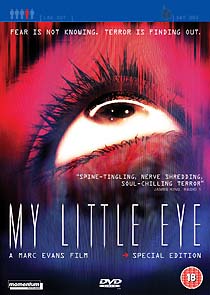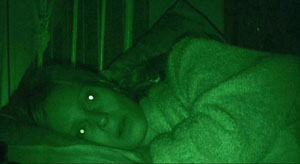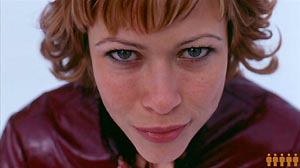 |
MY LITTLE EYEDirector: Marc EvansStarring: Sean Cw Johnson, Kris Lemche, Jennifer SkyFive young adults compete for a $1m prize, trapped for six months in a house full of cameras. My Little Eye is a pretty snappy thriller, for something that's basically a blend of And Then There Were None and Big Brother. It's poorly paced, has little character depth, and some lamentable dialogue, but inventive enough to succeed on its own terms.
Some very smart bunnies have worked on this disc, offering viewers a choice of two viewing modes: Standard Mode (which offers the film as it would have appeared in cinemas) and a clever Interactive Mode (which presents the film via a custom user interface, offering a variety of enhancements). The Standard Mode presents the film in anamorphic 1.78:1 ratio. The film was shot on DV-Cam, and then transferred to 35mm for its theatrical release. The transfer to disc is not especially outstanding, but in the context of the film (which is all meant to be seen from the point of view of the surveillance cameras), it's entirely adequate. The average bitrate is a very respectable 7.37Mb/sec. Original DV-Cam footage is sharp and stark, and the transfer to film and then back to video has inevitably softened the image, and added a layer of graininess. It seems odd that the DVD wasn't simply transferred from the original video source. It could be argued that the film transfer gives it a legitimacy that otherwise would have marked the movie as a straight-to-video release. In any case, the film look must be the director's preferred format, and ultimately that's what matters. The film has an extremely effective audio mix, presented on the disc in Dolby Digital 5.1, at 448kbps. The film uses sound very creatively to enhance mood, build tension and even to provide a few scares that traditionally would have been seen and not heard. The film is supported by optional English subtitles.
After the film's opening montage (which covers the first 180 days of the six months the contestants are in the house), the Interactive Mode screen offers a selection of five "archive" clips (basically deleted scenes), including a graphic scene where one of the characters guts a deer, in preparation for the evening meal. Later in the film another four "archive" clips are added, and become accessible.
Everything on Disc One of this two-disc set is "playing along" with the film's premise, except for the commentary track, by Welsh director Marc Evans and producer Jonathan Finn. The track is entertaining, and rarely flags. It reveals all sorts of fun trivia (which member of The Breakfast Club it was who refused permission for a clip featuring them from being used in the movie, and what happens when you give control of your cameras to your cast members, for example). Quite what foreign viewers will make of it (if it's made available to them), with its references to things like The Vicar of Dibley and Blake's 7, is anyone's guess!
There's about half an hour of deleted scenes, which are presented in full-frame format, in their original video format, which makes for an interesting comparison with the transferred-to-film footage. Some of deleted scenes were the source of the "Archive" extracts on the first disc, but most of the material is new, including the obligatory hot tub scene (not as exciting as it could have been) and a nice video-diary style scene featuring Jennifer Sky in her underwear. The deleted scenes have optional commentary, explaining why they were dropped from the film.
Momentum have created a disc that makes full use of the DVD format, a bold move in a market awash with cheap and cheerful players that often can't cope with anything very complex. Momentum's a label that constantly surprises (adding commentary tracks to neglected deep catalogue titles like Light Sleeper and The Changeling, for example), and this is a DVD that any company would be proud to offer. |


 On
disc, the $3m film has taken on a whole new life. If you didn't already
know that the film had already had a relatively successful theatrical
release (it grossed a very respectable £2.5m at the UK box office), you
might swear that the film was tailor made for DVD.
On
disc, the $3m film has taken on a whole new life. If you didn't already
know that the film had already had a relatively successful theatrical
release (it grossed a very respectable £2.5m at the UK box office), you
might swear that the film was tailor made for DVD.  Watching
the film in Interactive Mode is a lot of fun. The film is presented in a
box on the left hand side of the screen, while on the right are boxes
showing images of the five key cast members. Using your remote you can
click on each person to access the footage of their character's audition
for the contest. Underneath each headshot are the odds that the character
will win the contest, which are updated as events unfold. At several
points during the film other options are offered. There are four sequences
which offer a choice of four or five alternate angles in the big screen
(you can switch between them as the scene plays, or go back and watch the
scene in its entirety from each angle). Three of these scenes last about a
minute to minute and a half, and are interesting, although they don't
offer anything that relates to the plot (that is, there are no
"secrets" to discover). The fourth multi-angle scene is a sex
scene, running three and half minutes, in four angles (you do the maths!)
It's a voyeur's delight, even though it reveals once or twice that the
actors were definitely faking it! At this point I'd like to extend my
personal thanks to actress Jennifer Sky, for allowing its inclusion on the
DVD.
Watching
the film in Interactive Mode is a lot of fun. The film is presented in a
box on the left hand side of the screen, while on the right are boxes
showing images of the five key cast members. Using your remote you can
click on each person to access the footage of their character's audition
for the contest. Underneath each headshot are the odds that the character
will win the contest, which are updated as events unfold. At several
points during the film other options are offered. There are four sequences
which offer a choice of four or five alternate angles in the big screen
(you can switch between them as the scene plays, or go back and watch the
scene in its entirety from each angle). Three of these scenes last about a
minute to minute and a half, and are interesting, although they don't
offer anything that relates to the plot (that is, there are no
"secrets" to discover). The fourth multi-angle scene is a sex
scene, running three and half minutes, in four angles (you do the maths!)
It's a voyeur's delight, even though it reveals once or twice that the
actors were definitely faking it! At this point I'd like to extend my
personal thanks to actress Jennifer Sky, for allowing its inclusion on the
DVD. There
are two further enhancements: one is the "Tracker" screen, which
adds a map of the house with a flashing marker, which appears when two
particular characters are in the house (it's rather pointless, frankly).
The final enhancement is the chance to eavesdrop on the behind-the-scenes
chatter as certain scenes play out. This track certainly shouldn't be
accessed the first time a viewer sees the film, as it reveals plot points
before they're made clear to the ordinary viewers. Although it adds a new
dimension to the proceedings, it's rather banal, and strips away the
coldly impersonal mystery of who is pulling the strings, and why.
There
are two further enhancements: one is the "Tracker" screen, which
adds a map of the house with a flashing marker, which appears when two
particular characters are in the house (it's rather pointless, frankly).
The final enhancement is the chance to eavesdrop on the behind-the-scenes
chatter as certain scenes play out. This track certainly shouldn't be
accessed the first time a viewer sees the film, as it reveals plot points
before they're made clear to the ordinary viewers. Although it adds a new
dimension to the proceedings, it's rather banal, and strips away the
coldly impersonal mystery of who is pulling the strings, and why. The
second disc contains a variety of conventional bonus materials, including
an interesting half hour Making of... documentary, which reveals
how a disastrous test screening on September 11th, 2001 almost scuppered
the film, and the insecurities of the director (the producer decided not
to pass on the news that at one point the film was destined to go straight
to video). The documentary is a little self-congratulatory in parts, but
contains contributions from most of the key cast and crew members, and a
smattering of behind the scenes footage.
The
second disc contains a variety of conventional bonus materials, including
an interesting half hour Making of... documentary, which reveals
how a disastrous test screening on September 11th, 2001 almost scuppered
the film, and the insecurities of the director (the producer decided not
to pass on the news that at one point the film was destined to go straight
to video). The documentary is a little self-congratulatory in parts, but
contains contributions from most of the key cast and crew members, and a
smattering of behind the scenes footage. The
disc is rounded out by a photo gallery (set to music, lasting about seven
minutes), two theatrical trailers and four TV adverts (two 20" long,
and two 10" long). There are also credits for DVD authoring facility
The Pavement, (since they did such a sterling job, I'm happy to plug them
again here).
The
disc is rounded out by a photo gallery (set to music, lasting about seven
minutes), two theatrical trailers and four TV adverts (two 20" long,
and two 10" long). There are also credits for DVD authoring facility
The Pavement, (since they did such a sterling job, I'm happy to plug them
again here).